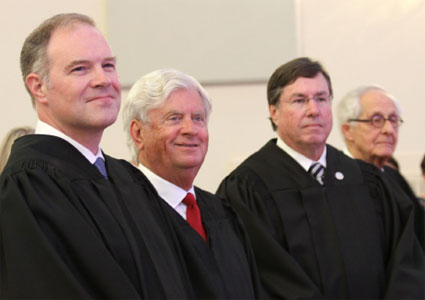
Administrative Office of Courts
|
Chief Justice Randolph congratulates Drug Court graduates May 8, 2019 Mississippi Supreme Court Chief Justice Mike Randolph congratulated 18 graduates of the Eighth Judicial District Drug Court during a ceremony on May 7 in Sebastopol.  “This is your day and I’m proud to be a part of it,” he said. “I can see the pride on your faces.” The graduates included seven from Leake County, seven from Scott County and four from Neshoba County. Thirty-three more people were recognized for their advancement to the third phase of the program, 18 advanced to the fourth phase, and 10 began the final, minimally supervised portion of their journey. About 350 people are enrolled in the program. The graduates had pleaded guilty to a range of drug possession charges and non-violent offenses such as larceny and forgery – offenses committed to get money to buy drugs. Sixteen of them will have their records expunged after their successful completion of Drug Court. Two who were convicted of driving under the influence are not eligible for charge expungement. Most of the graduates began the program under the supervision of Judge Vernon Cotten, who retired in 2017. Judge Cotten attended the program to see them graduate, giving hugs and handshakes. All but one participant spent four to four and a half-years in the program, said Drug Court Coordinator Marcus Ellis. One stayed longer. Damien Hill, 35, of Forest, was enrolled in the Drug Court program in 2010, but was sent to prison after he continued to use drugs and didn’t comply with other program requirements. “I learned that not only was I in prison, but my entire family and children were also suffering because of my actions,” Hill wrote in a letter read at graduation. Hill completed a prison alcohol and drug program and was allowed to return to Drug Court supervision, where he never tested positive for drugs again. “I have now been clean and sober for over four years. The Drug Court staff never gave up on me, and I have become a better person and a better father,” he wrote. One by one, graduates stood by Ellis as he recounted their accomplishments. Some earned high school diplomas or GED certificates. Several had completed or were working towards certifications in restaurant management, automotive mechanics and other trades. Two have been accepted into nursing school. Some regained driver licenses, reconnected with their families and started businesses. One is a volunteer firefighter. One graduate wasn’t there to get his diploma. He was stuck in an airport in the Northwest during a business trip, Ellis said. He owns and operates two businesses. Graduates thanked Drug Court staff and their families in letters asking to be allowed to graduate. Several wrote that they thought the program was a joke, until Drug Court staff caught them using drugs or committing other program violations. Drug Court operates with sanctions, including jail time, and rewards, eligibility for a clean record upon completion. They wrote about spiritual strength and family reunification and support. Ellis introduced the sister of one of the graduates. She had been the only support he had when he hit bottom with addiction. Graduate James Freeny of Standing Pine took the microphone to say, “I just want to thank my Mama for never giving up on me.” He used to be known as “Super Dave,” he said. “Now I’m known as just ‘Daddy’ to the people that matter to me.” Chadwick “Robert” Clark credited Drug Court with saving his life. “When I entered Drug Court, I was a lost soul and a lost cause in the eyes of most people, including myself. I was so deep into addiction and self-pity of my own mistakes that I was on a deadly downward spiral. My path of destruction was clearly going to be death or jail.” Joshua Rushing, 24, of Thomastown said in his letter to the court that he feels like a new person. It didn’t start out that way when he landed in Drug Court. “In the beginning, I just wanted to work the system to get back to my lifestyle,” he wrote. “I just didn’t want better for myself. I had to learn that I am worthy. I see what a sober life is like and I love it.” Circuit Judge Christopher Collins said, “A rebirth occurs when you go through Drug Court.” Circuit Judge Mark Duncan said the Eighth Circuit’s two graduation ceremonies held each year are his favorite events. “I enjoy seeing people succeed.” He told them to take advantage of the opportunities they have been and will be offered. Judge Duncan said, “There is opportunity out there that you really didn’t have until today” with completion of the Drug Court program. “Do not be satisfied with wherever you are. I want you to aim high and dream big.” Chief Justice Randolph told the graduates and participants that their bad decisions landed them in Drug Court, and encouraged them to make good choices to guide their futures. “It’s about choices. Before enrolling in Drug Court, you didn’t make the right decisions,” he said. “Now you have to keep making the right choices.” Finishing the Drug Court program gives them a second chance. He told them to face the future with determination, thinking “I can.” Turning to those who advanced through the Drug Court’s multiple phases, he said, “It’s up to you.” His advice also included “B”s: be nice, be fair, be honest, be humble and be yourself. Chief Justice Randolph reminded them that they would continue to be tempted by acquaintances to use drugs. But he encourage them to always turn them down. #### |